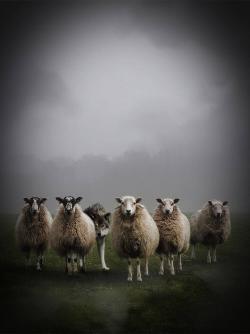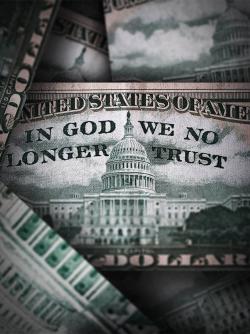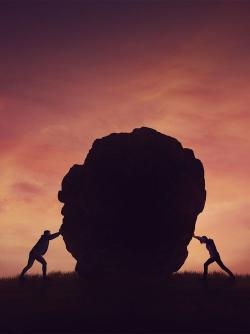"Britons Never Shall Be Slaves"?
When the British media erupted with controversy last summer over the historic “Rule, Britannia!,” most observers missed the real story. You need to know the truth behind the controversy, which you won’t read in The Telegraph or The Guardian! It is not about Britain alone—it is a lesson for everyone, no matter your race, ethnicity, or nation!
The Henry Wood Promenade Concerts (the Proms) are held over an eight-week period each summer. These daily classical music concerts sponsored by the BBC are enjoyed by millions across the U.K. and around the world in indoor and outdoor settings, but most notably at the Royal Albert Hall in London, where “Rule, Britannia!” and “Land of Hope and Glory” have historically been sung on the final night with great fanfare and no controversy—until 2020. How fitting for a year that saw so much conflict and change!
As it turned out, both songs were ultimately played and sung by a limited-size, self-distancing orchestra and choir. The usual hall-packing audience, which typically joins in, was missing, but controversy flared over whether those patriotic anthems remain suitable for modern Britain. As one commentator reported it, “The core of the story is: the Sunday Times reported that some people at the BBC held discussions about whether both Rule, Britannia and Land of Hope and Glory… could be played as part of Last Night of the Proms. After some very mild consideration, the BBC announced that yes, they could” (“This phoney war over Last Night of the Proms is everything we deserve,” TheGuardian.com, August 25, 2020).
Opponents gave COVID-19 precautions as an official excuse for initial plans to drop at least the singing of the anthems, but many perceive there was far more behind it. While extremely popular among most Brits, a few want “Rule, Britannia!” squelched entirely, seeing it as representing Britain’s former slave trade and colonial past.
History of “Rule, Britannia!”
The poem “Rule, Britannia!,” co-written by James Thomson and David Mallet, was set to music in 1740 by composer Thomas Arne. What is its importance?
The song has military connections, particularly with the Royal Navy, made evident by the words “Britannia, rule the waves”. However, according to Classic FM, when the piece was first written it was not celebrating naval success but instead “a cry for help” as the Royal Navy at that time did not have much control over the seas, while other countries were establishing empires. The song became more patriotic in the 1800s when the British Empire expanded across more of the world” (“Rule Britannia lyrics: The meaning and origins of the song, and the controversy over the Last Night of the Proms explained,” INews.co.uk, September 12, 2020).
The song differed from the poem in some subtle yet important ways. The poem’s “Britannia, rule the waves” (expressing a hope) became “Britannia rules the waves” (expressing “mission accomplished” as Britain grew in power). The original poem’s “Britons never will be slaves” became in song an emphatic refrain, “Britons never, ever ever will be slaves”—and in the current version a still stronger “Britons never, never, never shall be slaves.”
Some take that line to mean that while Britons traded in slaves, they themselves would never become slaves. But it can be understood totally apart from the slave trade as a declaration that Britain would never be conquered by other powers. For example, in the modern context, when Nigel Farage boisterously sings those words, one has little doubt that he means Britons will never, never, never be slaves of the European Union!
You do not have to be British to be stirred emotionally by the patriotic strains of “Rule, Britannia!” The grandeur of the refrain is moving and appeals to the human desire for greatness and independence. However, it is not the purpose of this article to take sides on the Proms controversy. We will leave that to The Sunday Times and the British tabloids. Instead, this article will explain what you will not read in the papers—and what no one else is seeing.
The Real Story
There is no doubt that Britain ruled the waves throughout the nineteenth century and the first half of the twentieth. It was through their dominant navy and the armies it transported that Britons controlled so many lands and peoples that one could truthfully say that “the sun never sets on the British Empire”—an amazing feat for a small, island nation off the northwest coast of Europe.
However, “Britons never, never, never shall be slaves,” belies the truth. Britons have been and currently are slaves. If you wonder how that can be, you are not alone. Some 1,900 years ago, others had the same question when told they were slaves. Notice it in that book of all books, the Bible: Jesus told the Jews of His day, “And you shall know the truth, and the truth shall make you free.” They retorted, “We are Abraham’s descendants, and have never been in bondage to anyone. How can You say, ‘You will be made free’?” Jesus replied, “Most assuredly, I say to you, whoever commits sin is a slave of sin” (John 8:32–34).
Jesus introduced a concept so foreign to the Jews of His day that they could not comprehend it. It is no different today. Britons are every bit as much slaves as the Jews of Jesus’ day—and they are not alone. The whole world is blinded to the bondage in which it is held!
But what did Jesus mean when He connected sin and slavery?
The epic movie The Ten Commandments is shown every year on television around the time the world celebrates Easter. The logic behind this is obvious: That is the time of year when Moses led the children of Israel out of Egyptian slavery. “Easter” is never mentioned in the movie or in the Bible, as that is the name of a pagan fertility goddess—which explains the association of the holiday with fertility symbols such as eggs, rabbits, and lilies. Easter had nothing to do with the Exodus. The biblical account is about Passover and the Days of Unleavened Bread, and this is portrayed in The Ten Commandments. (For more on this subject, see our free resource Easter: The Untold Story.)
The true story of the Exodus was that of an enslaved people being set free from harsh bondage. Passover was the night on which the Israelites’ firstborn were protected from death by the blood of a lamb smeared around the doors of their homes. But they were not free from slavery until they did their part by walking out of Egypt, something that took seven days and the miracle of the Red Sea. During that seven-day escape from Egyptian bondage, they did not have time to let their bread rise, but ate unleavened bread. The Bible shows that leavening typified sin (1 Corinthians 5:7–8) and Egypt was a symbol of both sin and bondage (Revelation 11:8), thus making the connection between sin and slavery.
Sin and Addiction
Addiction comes in many forms. Sexual behaviors outside of marriage have severe consequences, yet many are addicted to sexual vice. The results are diseases (some of which are life-threatening), unwanted pregnancies, and broken marriages that leave spouses devastated and children confused and often impoverished. And, in writing about the pain brought about by promiscuous behaviors, Dr. Miriam Grossman correctly points out in her book Unprotected that “there is no condom [no protective device] for the heart.”
The tobacco industry once portrayed smoking as something that “cool” people do. I learned at age six that it isn’t cool when I lost my dinner after a couple of puffs, but many young people of that time persevered through the nausea and other initial unpleasant effects in order to “fit in.” What was the result? They became addicted to nicotine within a short time and became slaves to an expensive habit that causes a variety of cancers, emphysema, heart disease, wrinkled skin, stained teeth, and nasty breath. Even knowing the potential dangers, many who thought they could “quit anytime they chose to” found it extremely difficult to break free from the enslaving habit, and many died miserable deaths as a result. Today, smoking has diminished in the Western world, only to be replaced with vaping—something also addictive and not without risks.
And the list of sinful behaviors goes on: abuse of alcohol, use of recreational drugs, lying, stealing, gossiping—all addictive behaviors with negative consequences! Instead of referring to the compulsion toward these actions as slavery, we call it addiction. It is human nature to think we are in control of our lives, but just as the Jews of Jesus’ day could not see that they were in bondage, so we are blind to who and what controls us.
The Apostle Paul equated sin with slavery and death. “Do you not know that to whom you present yourselves slaves to obey, you are that one’s slaves whom you obey, whether of sin leading to death, or of obedience leading to righteousness?” (Romans 6:16). And what is sin? Many—though sadly not all—agree that the use of enslaving recreational drugs and the consumption of pornography fall in the category of sin, but what actually determines the definition of sin? In the end, isn’t sin a biblical matter? So how does the Bible define sin? Do you know?
The biblical definition is found in 1 John 3:4: “Whoever commits sin also commits lawlessness, and sin is lawlessness”—or, as the older King James Version puts it, “sin is the transgression of the law.” This simple truth broadens the definition beyond drunkenness and sexual immorality. It is not difficult to equate some sins with harmful addictions. Other sins are more subtle but carry with them equally painful forms of bondage.
The first four of the Ten Commandments define our relationship with the Creator of mankind, and when they are violated we become enslaved by painful doctrines and ideas. If we substitute other gods for the true God, if we limit His power in our own minds by attempting to portray His likeness, if we disrespect His name and character, or if we rebel by choosing our day of worship over the day He set aside, a host of enslaving false doctrines always follows.
Believing that a deeply loved friend or relative is lost forever, suffering in hellfire, is terribly painful, but this false doctrine enslaves the minds of many. How many, not knowing the true God of creation and the real hope He holds out to us, live only for today and do little to prepare for eternity—essentially trapped in a limited existence? Instead of learning God’s plan for all mankind through His ordained Holy Days, people substitute pagan holidays and put the name of Christ on them. These sham celebrations, no matter how sincerely observed, leave people in the dark regarding God’s plan for them.
That certain holidays people observe come from heathen origins and therefore obscure the truth is without question. These compromises open the door to a host of wrong doctrines. As Eerdmans’ Handbook to the History of Christianity explains:
When in 321 Constantine made the first day of the week a holiday, he called it “the venerable day of the Sun” (Sunday)…. The Christian church took over many pagan ideas and images. From sun-worship, for example, came the celebration of Christ’s birth on the twenty-fifth of December, the birthday of the Sun. Saturnalia, the Roman winter festival of 17–21 of December, provided the merriment, gift-giving and candles typical of later Christmas holidays.
Few people understand how contrary to true doctrine these compromises with paganism are and how empty they leave one in the end. The erroneous doctrines the Jews were steeped in during Jesus’ day were different from modern professing Christianity, but all false doctrines enslave those who fall for them.
Mankind’s ideas of freedom are deceptions. How many professing Christians believe that God’s law brings bondage? Yet James calls it “the perfect law of liberty” that we will be judged by (James 1:25; 2:10–12) and John tells us, “For this is the love of God, that we keep His commandments. And His commandments are not burdensome” (1 John 5:3). Peter also warns against those who give a false hope of liberty: “While they promise them liberty, they themselves are slaves of corruption; for by whom a person is overcome, by him also he is brought into bondage” (2 Peter 2:19). Jesus declared the real path to freedom: “And you shall know the truth, and the truth shall make you free” (John 8:32).
Future Slaves
The British are not alone. All peoples and nations of the world are enslaved by sin. Yet there is another kind of slavery on the horizon that the British-descended nations, who are also descendants of Israel, need to be aware of. The refrain “Britons never, never, never shall be slaves” is sadly untrue—and America is not going to be great again. We no longer know our roots; we have forgotten our heritage and we have forgotten our God.
As the prophet Isaiah records about these nations, “‘The ox knows its owner and the donkey its master’s crib; but Israel does not know, My people do not consider.’ Alas, sinful nation, a people laden with iniquity, a brood of evildoers, children who are corrupters! They have forsaken the Lord, they have provoked to anger the Holy One of Israel, they have turned away backward” (Isaiah 1:3–4).
Yes, because we have forgotten our God, our God will forget us. Many prophecies show that the British-descended peoples will indeed be slaves. (For a fuller understanding of the identity of the British and American peoples, contact our nearest office and request a free copy of The United States and Great Britain in Prophecy, or read it at TomorrowsWorld.org.) Notice this remarkable prophecy for both Israel (the peoples descended from the “Ten Lost Tribes,” not so lost after all) and Judah (the Jewish people).
“For behold, the days are coming,” says the Lord, “that I will bring back from captivity My people Israel and Judah,” says the Lord…. Now these are the words that the Lord spoke concerning Israel and Judah…. “For that day is great, so that none is like it; and it is the time of Jacob’s trouble, but he shall be saved out of it. ‘For it shall come to pass in that day,’ says the Lord of hosts, “That I will break his yoke from your neck, and will burst your bonds; foreigners shall no more enslave them. But they shall serve the Lord their God, and David their king, whom I will raise up for them. Therefore do not fear, O My servant Jacob,’ says the Lord, ‘Nor be dismayed, O Israel; for behold, I will save you from afar, and your seed from the land of their captivity’” (Jeremiah 30:3–4, 7–10).
The time setting is when Christ returns, as is seen in the reference to David being resurrected and in the last sentence of this chapter: “In the latter days you will consider it.”
It is difficult to understand how the English and American peoples—Ephraim and Manasseh, according to your Bible—can be physically enslaved, but do not think it cannot happen. Twice in the last century, Britain and the United States were knocked back on their heels, and 2020 has shown how fast our world can turn upside down. The Bible describes greater natural disasters, disease pandemics, and divisions within nations that can change circumstances overnight. What God has prophesied will come to pass. The patriotic refrain “Britons never, never, never shall be slaves” is simply wrong. The slogan “Make America Great Again” is simply futile. We are already slaves to our sinful ways, and we will be physical slaves in the not-very-distant future unless we turn to God and away from our many sins.
But there is good news, as the above scripture shows. We will be “saved out of” our slavery. And God explains through the prophet Hosea, “I will return again to My place till they acknowledge their offense. Then they will seek My face; in their affliction they will earnestly seek Me.” And then they will say, “Come, and let us return to the Lord; for He has torn, but He will heal us; He has stricken, but He will bind us up” (Hosea 5:15; 6:1).
And those in other nations of the world should not think that these future events will happen in a vacuum. The whole world is in for a very rough time until humanity learns a painful lesson. Yes, there is good news of peace prevailing in the end, but how much easier would things be if all people everywhere were to turn to God and allow peace to come sooner? We do not see that happening on a national level today, but each of us individually can turn to God wholeheartedly, while there is still time. To learn more about what you can personally do, order our free publication What Is a True Christian?, or read it online at TomorrowsWorld.org.






